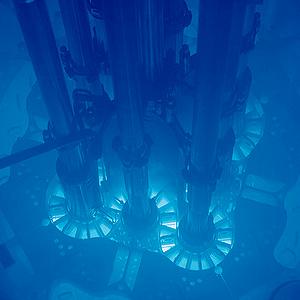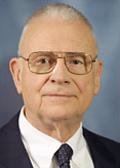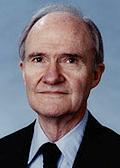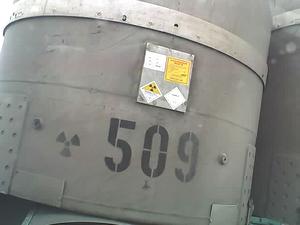Yucca Mountain's Dead. Next? Expert Panel Examines Nuclear Waste Options
WASHINGTON, DC, January 29, 2010 (ENS) - The U.S. Department of Energy announced today the formation of a blue ribbon commission to evaluate policy options for a safe, long-term solution to America' growing piles of spent fuel from commercial nuclear power plants and high-level radioactive waste from U.S. defense programs.
The panel will provide advice on how to handle approximately 77,000 tons of radioactive waste now stored at more than 100 sites around the country in view of the Obama administration's decision not to proceed with the Yucca Mountain nuclear waste repository in Nevada.
 |
Spent nuclear fuel plates glow bright blue. The core is submerged in cooling water. (Photo courtesy Argonne National Lab) |
"Nuclear energy provides clean, safe, reliable power and has an important role to play as we build a low-carbon future," said Energy Secretary Steven Chu, a Nobel Prize winning nuclear scientist.
"The administration is committed to promoting nuclear power in the United States and developing a safe, long-term solution for the management of used nuclear fuel and nuclear waste," Chu said. "The work of the blue ribbon commission will be invaluable to this process."
The 15 member Blue Ribbon Commission on America's Nuclear Future will be co-chaired by former Congressman Lee Hamilton, a Democrat from Indiana, and former National Security Advisor Brent Scowcroft, a Republican. The commission includes scientists, industry and labor representatives, former elected officials, and heads of environmental research organizations.
President Obama has directed Secretary Chu to establish the commission to conduct a comprehensive review of policies for managing the back end of the nuclear fuel cycle.
The Commission will consider alternatives for the storage, processing, and disposal of spent nuclear fuel and nuclear waste that remains from civilian and defense operations. An interim report is due within 18 months and a final report within 24 months.
 |
Lee Hamilton (Photo courtesy Indiana U.) |
"Finding an acceptable long-term solution to our used nuclear fuel and nuclear waste storage needs is vital to the economic, environmental and security interests of the United States," said Congressman Hamilton. "This will be a thorough, comprehensive review based on the best available science."
General Scowcroft said, "As the United States responds to climate change and moves forward with a long overdue expansion of nuclear energy, we also need to work together to find a responsible, long-term strategy to deal with the leftover fuel and nuclear waste. I'm pleased to be part of that effort along with Congressman Hamilton and such an impressive group of scientific and industry experts."
Senate Majority Leader Harry Reid, a Nevada Democrat, has fought for years to kill the Yucca Mountain nuclear waste disposal site, located 90 miles from Las Vegas on the outskirts of the Nevada Nuclear Test Site.
Early in the first term of President George W. Bush, Yucca Mountain was designated by the Congress and the President as the nation's only geologic repository for high-level radioactive waste. But even after 20 years of engineering, planning and testing, the Yucca Mountain site was plagued with safety concerns about water percolation and seismic activity, and the state of Nevada sued repeatedly to block the repository.
 |
Brent Scowcroft (Photo courtesy Texas A&M) |
Senator Reid said today that he and Secretary Chu agreed to create an expert panel as another in a series of steps being taken to terminate the Yucca Mountain project.
"When Secretary Chu and I came to the agreement that we needed to convene a panel of experts who would be charged with finding alternatives to storing nuclear waste in Nevada, I had confidence that he would find some of the smartest people in the country to do so. I'm pleased to see that I was right," Reid said today.
"It is important that we come up with responsible, alternative solutions to safely deal with nuclear waste in this country, and Yucca Mountain is not the answer," he said. "President Obama and I have worked closely to stop dumping taxpayer money into Yucca, and I have fought hard to ensure Yucca Mountain is dead."
The nuclear energy industry today welcomed the creation of the blue ribbon panel. Marvin Fertel, Nuclear Energy Institute president and chief executive officer, said, "As we head deeper into an era when reliance on nuclear energy is increasing globally, this is the right time to objectively weigh the viable options pertaining to the nuclear fuel cycle, from the management of used fuel to the potential for reprocessing and recycling that could better utilize nuclear fuel as a strategic national resource."
But the commission has already come under criticism by a national network of dozens of grassroots and national groups representing the concerns of communities near U.S. nuclear weapons sites.
 |
A container marked nuclear waste perched on a flatbed truck moves through Colorado Springs, December 16, 2005. (Photo by Mark Gallagher) |
The Alliance for Nuclear Accountability, ANA, says the membership of commission is not balanced despite its "repeated requests" to the Energy Department, because there is no member of the panel who represents communities near nuclear weapons sites and no outspoken critics of nuclear power.
"The Commission faces a huge credibility problem. It includes no one from communities downstream and downwind of major nuclear weapons sites," said Susan Gordon, director of the Alliance for Nuclear Accountability. "However, we are still hopeful that the Commission will find ways to consider a broad range of perspectives, including independent experts, public interest organizations, environmental and public health stakeholders, and impacted parties, including Native American tribes."
"Based on decades of experience in dealing with DOE and nuclear wastes, ANA supports interim stabilization and isolation of wastes at the point of origin in a manner that maximizes worker, public, and environmental protection," said Don Hancock, director of Southwest Research and Information Center's Nuclear Waste Safety Program. "ANA and its member organizations will actively advocate that position to the Commission and expects that it will come to that same conclusion."
"The Commission is largely composed of die-hard nuclear boosters along with business and political leaders who will promote the industry's self interest and profits," said Beatrice Brailsford of the Snake River Alliance in Idaho.
The members of the Blue Ribbon Commission are:
- Co-chair Lee Hamilton represented Indiana's 9th congressional
district from January 1965 to January 1999, serving as the ranking
member of the House Committee on Foreign Affairs and chairing the
Permanent Select Committee on Intelligence. Later, Hamilton served
as vice chairman of the 9/11 Commission. He currently serves on the
President's Homeland Security Advisory Council. He is also president
and director of the Woodrow Wilson International Center for
Scholars, and director of The Center on Congress at Indiana
University.
- Co-chair Brent Scowcroft is president of The Scowcroft Group, an
international business advisory firm. He has served as the National
Security Advisor to Presidents Gerald Ford and George H.W. Bush.
From 1982 to 1989, he was vice chairman of Kissinger Associates,
Inc., an international consulting firm. Scowcroft served in the
military for 29 years, and concluded at the rank of Lieutenant
General following service as the Deputy National Security Advisor.
Out of uniform, served on the President's Advisory Committee on Arms
Control, the Commission on Strategic Forces, and the President's
Special Review Board, also known as the Tower Commission.
- Mark Ayers, President, Building and Construction Trades
Department, AFL-CIO
- Vicky Bailey, Former Commissioner, Federal Energy Regulatory
Commission; Former Department of Energy Assistant Secretary for
Policy and International Affairs
- Albert Carnesale, Chancellor Emeritus and Professor, University
of California - Los Angeles
- Pete Domenici, Senior Fellow, Bipartisan Policy Center; former
U.S. Senator, Republican from New Mexico who chaired the Senate
Energy Committee, an author of two books advocating nuclear power
- Susan Eisenhower, President, Eisenhower Group, Inc.
- Chuck Hagel, Former U.S. Senator, a Republican from Nebraska, a
member of Global Zero, an international initiative dedicated to
achieving a binding, verifiable agreement to eliminate all nuclear
weapons
- Jonathan Lash, President, World Resources Institute, an
environmental think tank
- Allison Macfarlane, Associate Professor of Environmental Science
and Policy, George Mason University
- Richard Meserve, President, Carnegie Institution for Science,
and former Chairman, U.S. Nuclear Regulatory Commission
- Ernie Moniz, Professor of Physics and Cecil & Ida Green
Distinguished Professor, Massachusetts Institute of Technology
- Per Peterson, Professor and Chair, Department of Nuclear
Engineering, University of California - Berkeley
- John Rowe, Chairman and Chief Executive Officer, Exelon
Corporation
- Phil Sharp, President, Resources for the Future, a nonprofit research group focused on environmental, energy, natural resource and public health issues
Copyright Environment News Service (ENS) 2010. All rights reserved.
To subscribe or visit go to: http://www.ens-newswire.com